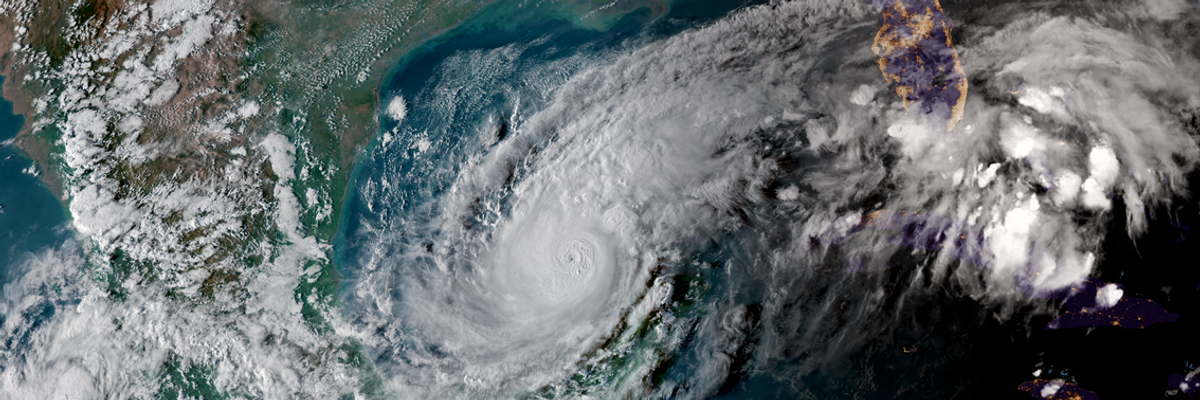
A satellite image shows Hurricane Milton, which briefly became a Category 5 storm on Monday.
Ocean Heat Fueling Hurricane Milton Was Made Up to 800 Times More Likely by Climate Crisis
"Climate change clearly warmed the Gulf waters that fueled Milton's development, likely supercharging its rapid intensification and making this hurricane much more dangerous."
As Floridians raced to prepare for and escape the path of Hurricane Milton, an analysis published Monday showed that high sea-surface temperatures fueling the monstrous storm's rapid intensification were made between 400 and 800 times more likely by the climate crisis.
The research organization Climate Central noted that Milton, which is expected to make landfall in the populous Tampa Bay metropolitan area on Wednesday night, is a "historically powerful" storm that has "undergone extreme rapid intensification over sea-surface temperatures warmed by climate change."
Sea-surface temperatures in the area where Milton has developed "are at or above record-breaking highs," Climate Central observed, conditions that have allowed the storm to quickly become what the U.S. National Hurricane Center (NHC)
described as an "extremely serious threat to Florida," a state still reeling from the destructive Hurricane Helene.
"Climate change clearly warmed the Gulf waters that fueled Milton's development, likely supercharging its rapid intensification and making this hurricane much more dangerous," said Daniel Gilford, a meteorologist at Climate Central. "Fossil fuel pollution is amplifying this threat."
As New York Times climate reporters Raymond Zhong and Mira Rojanasakul explained Monday, "For a year and a half now, the upper layer of the world's oceans has been at or near its hottest temperatures on record."
"The seas absorb most of the extra heat that carbon dioxide and other greenhouse gases trap near Earth's surface," the pair wrote. "So the same human-caused forces that have been bringing abnormal heat to towns, cities, and landscapes are helping to warm the oceans."
Milton exploded from a tropical storm to a Category 5 hurricane in just over 24 hours—intensification that scientists Jeff Masters and Bob Henson called "a spectacular and ominous feat." The storm has since weakened slightly to a Category 4 as it moves across the Gulf of Mexico, but it is still expected to be devastating.
"It is very likely that Milton will be a highly destructive hurricane costing over $10 billion for Florida—and Milton could end up placing among the costliest U.S. hurricanes on record, depending on the eventual details of landfall," they wrote Monday. "The risk is also high that Milton will be very deadly if people in low-lying areas do not heed evacuation orders and flee the hurricane."
Many Florida counties are under voluntary or mandatory evacuation orders as Milton barrels toward the state just days after Helene ripped through the region, wreaking deadly havoc across six states.
"Some of the same communities ravaged by Helene are now facing this new threat. Millions of Floridians may be asked to evacuate," the American Red Cross said in a statement. "Helene and Milton are both examples of how extreme weather is becoming more frequent and intense. In this case, meteorologists say Helene's intense and far-reaching rainfall—which extended hundreds of miles from the coast—can be attributed to the climate crisis. And Milton is already the third-fastest rapidly intensifying storm on record in the Atlantic, according to more than 40 years of data from the National Hurricane Center."
The Associated Press noted late Monday that "as evacuation orders were issued, forecasters warned of a possible 8- to 12-foot (2.4- to 3.6-meter) storm surge in Tampa Bay."
"That's the highest ever predicted for the region and nearly double the levels reached two weeks ago during Helene," AP reported, citing a spokesperson with the NHC.
An Urgent Message From Our Co-Founder
Dear Common Dreams reader, The U.S. is on a fast track to authoritarianism like nothing I've ever seen. Meanwhile, corporate news outlets are utterly capitulating to Trump, twisting their coverage to avoid drawing his ire while lining up to stuff cash in his pockets. That's why I believe that Common Dreams is doing the best and most consequential reporting that we've ever done. Our small but mighty team is a progressive reporting powerhouse, covering the news every day that the corporate media never will. Our mission has always been simple: To inform. To inspire. And to ignite change for the common good. Now here's the key piece that I want all our readers to understand: None of this would be possible without your financial support. That's not just some fundraising cliche. It's the absolute and literal truth. We don't accept corporate advertising and never will. We don't have a paywall because we don't think people should be blocked from critical news based on their ability to pay. Everything we do is funded by the donations of readers like you. Will you donate now to help power the nonprofit, independent reporting of Common Dreams? Thank you for being a vital member of our community. Together, we can keep independent journalism alive when it’s needed most. - Craig Brown, Co-founder |
As Floridians raced to prepare for and escape the path of Hurricane Milton, an analysis published Monday showed that high sea-surface temperatures fueling the monstrous storm's rapid intensification were made between 400 and 800 times more likely by the climate crisis.
The research organization Climate Central noted that Milton, which is expected to make landfall in the populous Tampa Bay metropolitan area on Wednesday night, is a "historically powerful" storm that has "undergone extreme rapid intensification over sea-surface temperatures warmed by climate change."
Sea-surface temperatures in the area where Milton has developed "are at or above record-breaking highs," Climate Central observed, conditions that have allowed the storm to quickly become what the U.S. National Hurricane Center (NHC)
described as an "extremely serious threat to Florida," a state still reeling from the destructive Hurricane Helene.
"Climate change clearly warmed the Gulf waters that fueled Milton's development, likely supercharging its rapid intensification and making this hurricane much more dangerous," said Daniel Gilford, a meteorologist at Climate Central. "Fossil fuel pollution is amplifying this threat."
As New York Times climate reporters Raymond Zhong and Mira Rojanasakul explained Monday, "For a year and a half now, the upper layer of the world's oceans has been at or near its hottest temperatures on record."
"The seas absorb most of the extra heat that carbon dioxide and other greenhouse gases trap near Earth's surface," the pair wrote. "So the same human-caused forces that have been bringing abnormal heat to towns, cities, and landscapes are helping to warm the oceans."
Milton exploded from a tropical storm to a Category 5 hurricane in just over 24 hours—intensification that scientists Jeff Masters and Bob Henson called "a spectacular and ominous feat." The storm has since weakened slightly to a Category 4 as it moves across the Gulf of Mexico, but it is still expected to be devastating.
"It is very likely that Milton will be a highly destructive hurricane costing over $10 billion for Florida—and Milton could end up placing among the costliest U.S. hurricanes on record, depending on the eventual details of landfall," they wrote Monday. "The risk is also high that Milton will be very deadly if people in low-lying areas do not heed evacuation orders and flee the hurricane."
Many Florida counties are under voluntary or mandatory evacuation orders as Milton barrels toward the state just days after Helene ripped through the region, wreaking deadly havoc across six states.
"Some of the same communities ravaged by Helene are now facing this new threat. Millions of Floridians may be asked to evacuate," the American Red Cross said in a statement. "Helene and Milton are both examples of how extreme weather is becoming more frequent and intense. In this case, meteorologists say Helene's intense and far-reaching rainfall—which extended hundreds of miles from the coast—can be attributed to the climate crisis. And Milton is already the third-fastest rapidly intensifying storm on record in the Atlantic, according to more than 40 years of data from the National Hurricane Center."
The Associated Press noted late Monday that "as evacuation orders were issued, forecasters warned of a possible 8- to 12-foot (2.4- to 3.6-meter) storm surge in Tampa Bay."
"That's the highest ever predicted for the region and nearly double the levels reached two weeks ago during Helene," AP reported, citing a spokesperson with the NHC.
As Floridians raced to prepare for and escape the path of Hurricane Milton, an analysis published Monday showed that high sea-surface temperatures fueling the monstrous storm's rapid intensification were made between 400 and 800 times more likely by the climate crisis.
The research organization Climate Central noted that Milton, which is expected to make landfall in the populous Tampa Bay metropolitan area on Wednesday night, is a "historically powerful" storm that has "undergone extreme rapid intensification over sea-surface temperatures warmed by climate change."
Sea-surface temperatures in the area where Milton has developed "are at or above record-breaking highs," Climate Central observed, conditions that have allowed the storm to quickly become what the U.S. National Hurricane Center (NHC)
described as an "extremely serious threat to Florida," a state still reeling from the destructive Hurricane Helene.
"Climate change clearly warmed the Gulf waters that fueled Milton's development, likely supercharging its rapid intensification and making this hurricane much more dangerous," said Daniel Gilford, a meteorologist at Climate Central. "Fossil fuel pollution is amplifying this threat."
As New York Times climate reporters Raymond Zhong and Mira Rojanasakul explained Monday, "For a year and a half now, the upper layer of the world's oceans has been at or near its hottest temperatures on record."
"The seas absorb most of the extra heat that carbon dioxide and other greenhouse gases trap near Earth's surface," the pair wrote. "So the same human-caused forces that have been bringing abnormal heat to towns, cities, and landscapes are helping to warm the oceans."
Milton exploded from a tropical storm to a Category 5 hurricane in just over 24 hours—intensification that scientists Jeff Masters and Bob Henson called "a spectacular and ominous feat." The storm has since weakened slightly to a Category 4 as it moves across the Gulf of Mexico, but it is still expected to be devastating.
"It is very likely that Milton will be a highly destructive hurricane costing over $10 billion for Florida—and Milton could end up placing among the costliest U.S. hurricanes on record, depending on the eventual details of landfall," they wrote Monday. "The risk is also high that Milton will be very deadly if people in low-lying areas do not heed evacuation orders and flee the hurricane."
Many Florida counties are under voluntary or mandatory evacuation orders as Milton barrels toward the state just days after Helene ripped through the region, wreaking deadly havoc across six states.
"Some of the same communities ravaged by Helene are now facing this new threat. Millions of Floridians may be asked to evacuate," the American Red Cross said in a statement. "Helene and Milton are both examples of how extreme weather is becoming more frequent and intense. In this case, meteorologists say Helene's intense and far-reaching rainfall—which extended hundreds of miles from the coast—can be attributed to the climate crisis. And Milton is already the third-fastest rapidly intensifying storm on record in the Atlantic, according to more than 40 years of data from the National Hurricane Center."
The Associated Press noted late Monday that "as evacuation orders were issued, forecasters warned of a possible 8- to 12-foot (2.4- to 3.6-meter) storm surge in Tampa Bay."
"That's the highest ever predicted for the region and nearly double the levels reached two weeks ago during Helene," AP reported, citing a spokesperson with the NHC.

